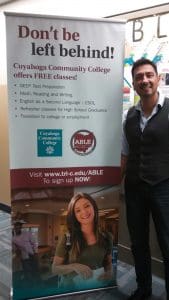 On September 23, 2013, I sat down at the desk in my childhood bedroom with a pencil and a blue plaid notebook and began writing what I could only assume would become the next great American novel. I tailored the story to my sister’s interests so I wouldn’t lose my only audience member and I (am ashamed to say) stole half of my plot from a James Patterson novel. By the time my work progressed to a second notebook, it was chock-full of completely autonomous teenagers, the governmental authorities trying to take them down, and countless grammatical errors. Yikes!
On September 23, 2013, I sat down at the desk in my childhood bedroom with a pencil and a blue plaid notebook and began writing what I could only assume would become the next great American novel. I tailored the story to my sister’s interests so I wouldn’t lose my only audience member and I (am ashamed to say) stole half of my plot from a James Patterson novel. By the time my work progressed to a second notebook, it was chock-full of completely autonomous teenagers, the governmental authorities trying to take them down, and countless grammatical errors. Yikes!
While this may have been the piece that ignited my passion for creative writing, I can say with confidence that my prose has gained much more originality and potential in the past five years. In fact, this March I presented the narrative approach of my (new) unpublished manuscript at the Mid-East Honors Association Conference in Columbus, Ohio.
One of the main things that helped me to become a better writer was enrolling in creative writing workshops. The workshops not only shaped a foundation for my writing skills, but allowed me to discover the benefit of having others critique my work. In fact, I loved the class so much that I decided to make creative writing my major! Now, I’m a junior at Baldwin Wallace University and want to help others experience the extensive joys and benefits of writing.
For that reason, I founded a small startup, Ink Above All, an organization that offers creative writing workshops to both adults and high school students living in North East Ohio. The workshops are taking place at Avon Oaks Country Club in Avon, and run for two weeks each. I hope these workshops will serve to improve not only the English and writing skills of those enrolled, but will provide them with a safe environment for creative collaboration. I want everyone involved to feel liberated to express themselves, take creative risks, and communicate freely, because no matter who you are or where you’re from, you have a story to tell.
What you’re passionate about is what makes you unique, and there’s a story in that just waiting to be told. If you’ve never thought about putting pen to paper (or hands to keyboard) and telling your story, now might just be the time. Even if you don’t want to tell your story, there are so many things waiting to be written about. Just think, from activism and political movements to your dreams and made up fantasies, there’s no limit on what you could create.
So, why should you get out and write something? Because creative writing has been shown to positively impact your brain in more ways than one! Writing creatively not only affects your ability to write, but it improves your memory, increases your intelligence, and furthers your vocabulary. Additionally, a workshop allows you to “develop your creative thinking and problem-solving abilities by analyzing different writing styles and working on your own projects.” This is a valuable skill set for any career.
Furthermore, the workshop environment gives you an opportunity to practice giving and receiving constructive criticism. This translates into improved critical thinking skills and an ability to evaluate the work of your colleagues. You will learn to organize ideas, write with clarity, and think logically to organize a story. Moreover, being around a diverse group of personalities will make you well-rounded as an individual. As a workshop participant, you will gain confidence, lasting friends, and a passion for writing.
The environment that you chose to write in makes a difference, which is why I’ve decided to hold Ink Above All’s workshops in a beautiful conference room overlooking an extensive golf course. Additionally, I set aside some designated workshop days for participants to go outside and experience writing in nature. The practice of spending time outdoors is fleeting in our technology-fueled culture despite the fact that it has been associated with all kinds of benefits ranging from mental clarity to increased creativity.
Workshops offer writers a new environment in which to learn and develop further social intelligence. Social intelligence is made up of two separate elements, social awareness, and social facility. Social awareness “refers to qualities including empathy, attunement to others and social cognition,” whereas social facility refers to “how we use our internal social awareness to interact with individuals and groups successfully, such as self-presentation, influence and concern for others.” Both of these skill sets are considered a long-term benefit of extracurricular summer activities, such as writing workshops, and will follow students for the rest of their lives, making a huge impact on future careers.
If you’re interested, I encourage you to grab a pen and sign up for a workshop, because you have a story, and the world is waiting to hear it.
www.InkAboveAll.org
https://www.facebook.com/InkAboveAll/


 On September 23, 2013, I sat down at the desk in my childhood bedroom with a pencil and a blue plaid notebook and began writing what I could only assume would become the next great American novel. I tailored the story to my sister’s interests so I wouldn’t lose my only audience member and I (am ashamed to say) stole half of my plot from a James Patterson novel. By the time my work progressed to a second notebook, it was chock-full of completely autonomous teenagers, the governmental authorities trying to take them down, and countless grammatical errors. Yikes!
On September 23, 2013, I sat down at the desk in my childhood bedroom with a pencil and a blue plaid notebook and began writing what I could only assume would become the next great American novel. I tailored the story to my sister’s interests so I wouldn’t lose my only audience member and I (am ashamed to say) stole half of my plot from a James Patterson novel. By the time my work progressed to a second notebook, it was chock-full of completely autonomous teenagers, the governmental authorities trying to take them down, and countless grammatical errors. Yikes! (This week is Adult Education and Family Literacy Week. It is a week to highlight the impact and importance of adult literacy not only on the students but on their families as well. Below is an inspiring story of one adult education student from the Tri-C Aspire program.)
(This week is Adult Education and Family Literacy Week. It is a week to highlight the impact and importance of adult literacy not only on the students but on their families as well. Below is an inspiring story of one adult education student from the Tri-C Aspire program.)